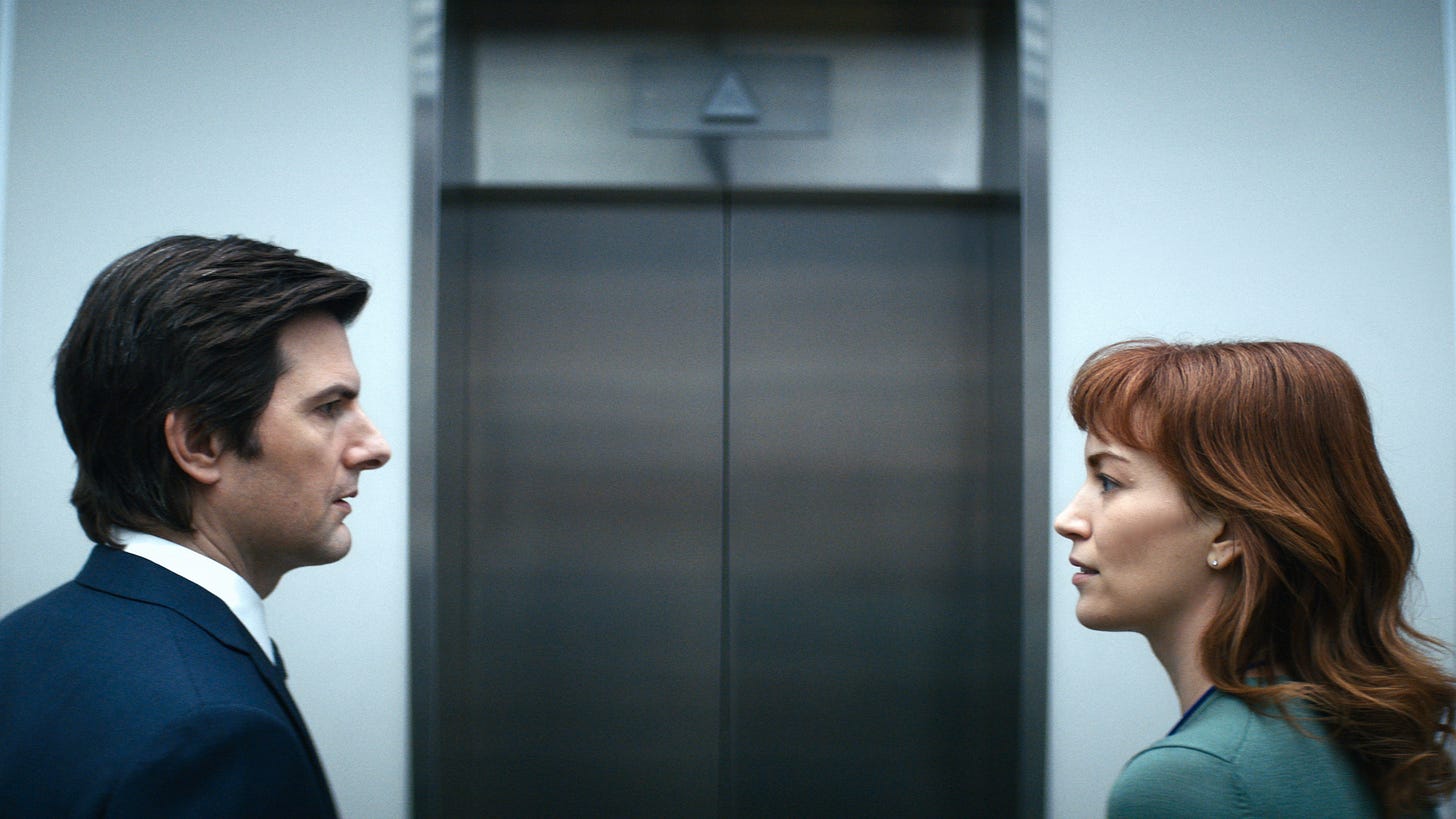Can Severance fans handle the heat?
Defending sex scenes, citing Petrarch, and how (I hope) love conquers all
Heavy spoilers and lots of presuming your familiarity with the show ahead
In anticipation of last week’s episode, I came across a uniquely irritating, surprisingly popular post on the Severance (Apple TV+) subreddit:
Image: r/SeveranceAppleTVPlus, Reddit
I don’t want to be cruel to u/According_Rice_1822. They’ve probably had a rough few days since the airing of S2 E4, ‘Woe’s Hollow’, which sees Mark (Adam Scott) and not-quite-Helly (Britt Lower) consummate the supervisor/subordinate relationship by fucking on the company retreat.
Unsurprisingly, though, I don’t like what this says, or implies. My main issue is with the notion of the sex scene as ‘a cheap trick’, ‘straight shagging’, or some heinous stray from the world of ‘beautiful’, ‘classy’ television - whatever that is. I can take their word for it when they deny any conservative outlook on sex, purely because I don’t think that’s a useful or relevant insult to wield in this situation. ‘Prudish’ is just the wrong descriptor. ‘Close-minded’, ‘dismissive’, and ‘oddly self-conscious’ are better.
I’m getting cocky. The truth is that desire has never not been my primary interest in art, literature, and the world at large. ‘Love has always been the chief business of my life’, writes Dorothy Strachey, and I really don’t think I’ve ever resonated with anything more. I consider myself a poster child for the idea that pubescent hedonism can get you pretty far if your attention happens to be briefly diverted from yearning one day, and lands on the right book.
While I’m possibly someone with an above-average understanding of how art does desire, then, I’m not interested in picking a fight. I’m interested in when something fundamentally correct sits within a thing that’s articulated a little weirdly, and seems askew. Whether u/According_Rice_1822 meant it or not, their post seems to me to be a misdirected appreciation of a bigger phenomenon: Severance is masterfully deliberate with desire, which makes its first (and perhaps last) explicit encounter with sex one of the most significant scenes of the show so far.
If its treatment of love seems restrained, or oh-so ‘classy’, this is because Severance is a clever, perfection-seeking piece of prestige TV, sticking closely to its thematic wants and needs. Watching the innies pace back and forth across the sterile hutch of the severed floor, it’s inevitable that any clumsy introduction of attraction, fascination, flirtation, or lust would swiftly fizzle out in such a sanitised and sexless atmosphere. By this, I don’t mean that harsh environments are inherently overpowering, rather that relenting to pleasure is specifically and wholly incongruent with space and place in Severance; the general corporate office, and Lumon’s particular, puritan philosophy.
What I’m trying to say is that if desire wasn’t written well, here, we’d be very jarred. This is why people end up seeing sex, or even a character’s wanting of it, as one of media’s ‘cheap trick[s]’. The issue isn’t the act in itself, but how you go about it. Perhaps that’s familiar.
So, it’s significant that the design of the show – whether we’re within Lumon walls or not, actually – rarely permits true mess. There’s a reason why images like Petey’s death, Graner’s bloody murder, and mangled anon. seal(?) carcass stick with us in Severance. Even outie Mark’s house is spotless, and he’s going through it. This is how Stiller et al. extend the affect of the surveillance state beyond just the pure fact of Lumon itself, deliberately washing their whole production dystopian; sleek and squeaky-clean; bleached with fear. In any such setting, disobedience is dirty.
Disobedience is more than just sneaking around, smuggling contraband, or chewing on your superior until you draw blood, though. Kier Eagan’s ideal of suppressing the ‘four tempers’ means that displays of extreme emotion are outright punishable on the severed floor; heavily frowned upon elsewhere. Though I don’t want to spend too much time talking about it, it’s nonetheless pretty vital to note that (not dissimilar to a real-world corporate setting) leaving your depressive, antisocial, irritable, or horny tendencies at the door is therefore expected when clocking in for a day at Lumon. This is, in part, what severance is for.
But enough of the foreplay. Let’s take a look at a few Mark-Helly moments. I’ll get to tent sex, but the first is from S1 E8, ‘What’s For Dinner?’, where the pair sit, fuchsia-bathed in the office kitchenette, and stumble into mutual admission.
The beauty of this scene lies in how slight an acknowledgement of attraction this really is. With the help of good ol’ weighty silence, loaded eye contact, and some super subtle lighting, Helly and Mark’s flirtation rides right up to that sweet boundary of something serious:
H: You pretended to care about me pretty well.
M: You’re easy to pretend to care about.
H: Thank you. As are you.
We know what this is, even if nothing strictly crosses the threshold into the zone of explicit, obvious confession. The effect is something totally ambrosian.
(Turning off the mood lights for a minute: I’m yet to see anyone point out how this is, frankly, an insane bit of dialogue to give to your actors. It’s the very first thing I thought about. ‘Pretending to care’ about your in-universe crush is all an actor whose character has a love interest actually does. Go and watch this scene back if you hadn’t considered it before, and I bet you’ll be even more transfixed. Dan Erickson, take a bow.)
Whether it’s Mark and Helly, Burt and Irving, or whatever Cobel’s got going on, it’s implicitly understood that acting upon one’s longings as an innie is extreme, unsuitable, and somewhat incomprehensible. The board kindly requests you ‘spill your lineage’ outside of working hours, please. Yet our two protagonists act on it anyway, pretty naturally. I think this is the point: that Severance’s characters can’t help but do something about their attraction regardless of these idiosyncrasies, because, well, how else do we get by? Why not see what happens?
Such a set-up of restraint versus relenting plays a large part in this show’s careful excellence, as its plot points turn depictions of desire up to eleven. After all, obsessing over someone is a state in which we are both firmly under control, and violently out of it. A good example to bring up here is Mark and Helly’s first kiss.
Helly’s lunge out of the elevator makes the romantic climax of Season 1 exactly what it is because she holds herself back, then lets go. I mean, listen, I’m sure it’d still be a pretty good bit of TV even if she didn't go in, and out, and in again. Yet, being subject for just a little longer to this picture of passion lingering in wait, then bursting out and emerging triumphant is vital in the sense of the show’s wider messaging, and speaks to a crucial truth about humans; real human relationships. Connection is never seamless or immediate. We aren’t capable of a perfect assimilation into one another. We cannot pull down the walls that prevent us from being able to read someone’s mind.1 So, we relate to depictions of imperfection, of indecision, especially when it parades itself as ‘perfect timing’.
Of course, too, this is one of the final times we see Helly abandoning to herself to impulse. She is a risk-taker, willing to set herself on fire in the name of what feels right, and feeling itself. This desire-driven, last-minute decision feeds into the theme of mess set against something spotless; excess at war with balance. This brings us to Helly R. versus Helena E.
Though Helly is the one to first make out with Mark, it’s Helena who gets to fuck him. At this point in the series, it seems as though one actually envies the other’s raging habit of acting on impulse, as the innie can perhaps tap into a freedom the outie can only dream of. We can consider that Helena desires Mark in a slightly different way, based on her having lived a much different life. Still, she desires him all the same. In ‘Woe’s Hollow’, this culminates in some ‘straight shagging’ on the floor of a tent, lit only by the warmth of a portable heater.
What I find most important in this red-hot scene, however, is how it is so deftly cut into bits by blue shots of a blisteringly cold Irving (John Turturro), walking through the forest alone.
I should show you some Petrarch:
I freeze and burn, love is bitter and sweet, my sighs are tempests and my tears are floods, I am in ecstasy and agony, I am possessed by memories of her and I am in exile from myself.
While Irving freezes, Mark and Helena burn. In what might seem like a gratuitous sex scene to some, we are exposed to a howling dialogue between ‘ecstasy’ and ‘agony’, laden with meaning. Irving’s swift separation from Burt (Christopher Walken) and his ‘sweet’ office romance has left him ‘bitter’, and near death. When Mark’s presumed reintegration sickness results in Helena momentarily glitching into Gemma, we are reminded that he is ‘possessed by memories of her’. Being severed in itself is being ‘in exile from [one]self’, and experiencing ‘sighs’ as ‘tempests’ and ‘tears’ as ‘floods’ is reminiscent of an overflow of the four tempers.
Even without the aid of Il Canzoniere, this scene is a symbolist’s dream. Sex on screen can do so much with so little. ‘Woe’s Hollow’ brings the heat of closeness and frozen isolation into contact, and we melt.
This is where my second and final question to those on the subreddit comes in. Following the airing of Episode 4, I have seen seas of theorists (on other platforms too, to be fair) pounce straight on the idea that Helena’s aim is to produce a fresh Eagan heir. Now, I’m not saying I’m not prepared for this to be true. It could well be an aim. But I’m a little struck by the sheer volume of people who watched this scene and sprinted to its practical implications, particularly after spending several weeks posting about Helena’s evident attraction to Mark.
Do we have to move so quickly past deliberate artistry, just so we can land upon the hottest new prediction? I know that many, many Severance fans are engaged in more than just the theorising, but, as fun as theories are, and as unsurprising as this perhaps is, it sort of saddens me that this is what’s popular. It swallows most of everything else up.
I should say that I encourage critical thinking now more than ever. I am not trying to suggest that anyone should be turning their brain off at the moment. But with great TV, often it seems like everyone is only desperate for the resolution. We are all trawling the comments, digging for the best explanation. In the paranoid pushing-together of hundreds and hundreds of unique details, everyone wants to be the very first to form the perfect connection.
Love is the backbone of Severance, because it is the backbone of those you want to see win. Keep theorising, but zoom out. Sit back, and enjoy desire for what it is. Instant gratification is not what is attractive about a week-by-week release schedule, any slow-burn narrative, or, indeed, experiencing attraction for yourself.
It’s OK to not know what this immensely full, astonishingly well-made show has planned for its audience – personally, I prefer to be in the dark, in between the sheets.
For more on this, I highly recommend Slavoj Žižek’s ‘The Apocalypse of a Wired Brain’ (2020). It pisses on Musk and Neuralink. I think fans of this show will also enjoy finding out about singularity.






